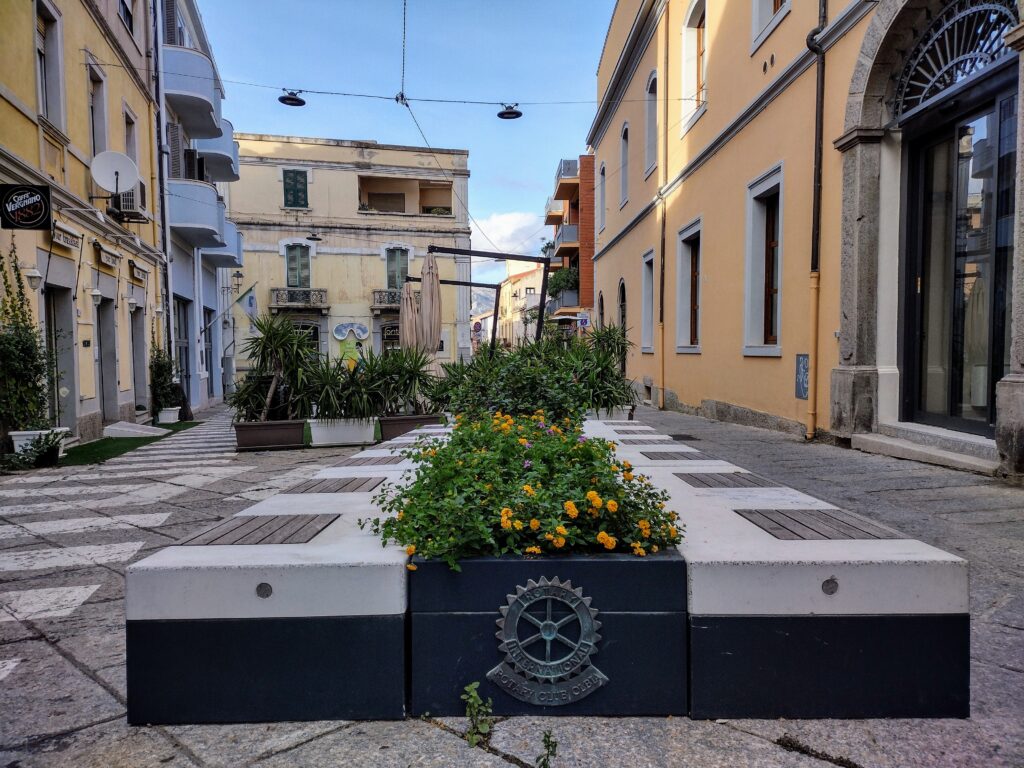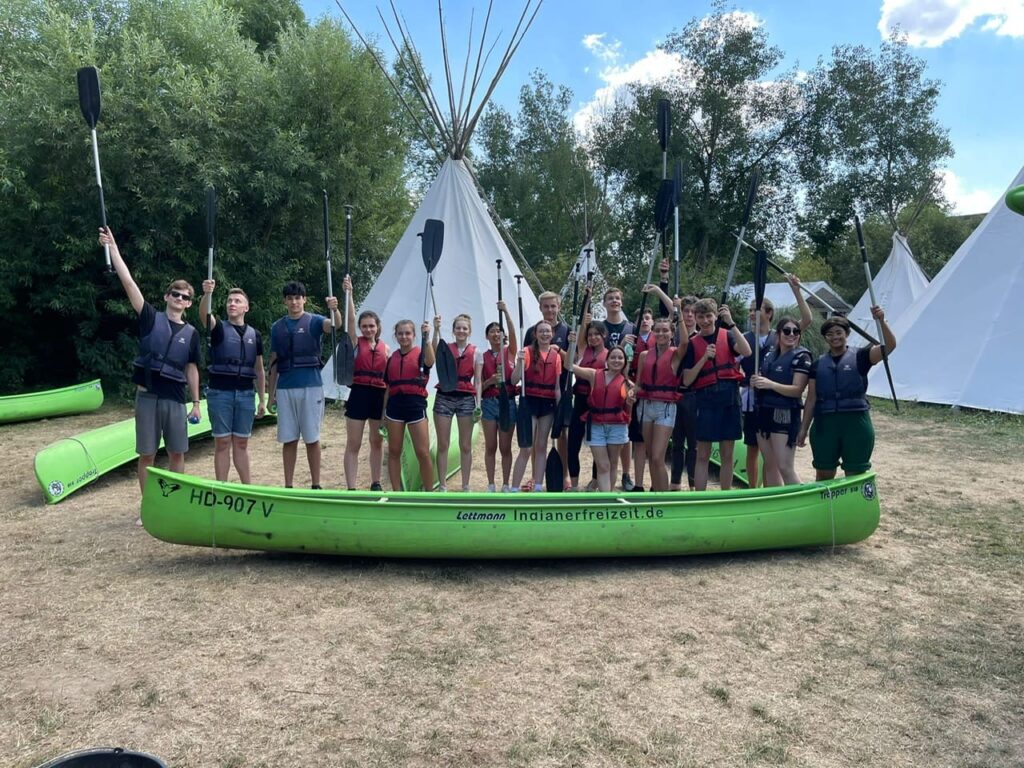At the time of writing this article, I am in the small Sardinian port city of Olbia enjoying the last warmth of summer. I am now halfway through a two-month adventure around Europe, visiting some of the many places I had yet to experience around the continent.
As I walked through Olbia’s old town this past week, I came across a bench with a Rotary logo. Since I first learned about Rotary when I was 16, I’ve consciously, and likely subconsciously, sought out the familiar Rotary wheel in cities and towns across the world. Though I am used to seeing it around Yorkshire and Lincolnshire and other places I have lived, there is something slightly different and exciting when I come across it in other countries.
Over the past several weeks, I’ve stayed with friends and acquaintances in cities and villages such as Leiderdorp (Netherlands), Luxembourg, Neunkirch and Geneva (Switzerland) and Olbia and Pesaro (Italy). In most of those places, I’ve seen Rotary’s logo, a literal mark on communities where likeminded people are positively impacting on local, District and worldwide lives.

Inspired by my travels, this month I looked at some of the things Rotary is doing around different parts of Europe to reach new audiences across different cultures and generations.
Welcoming a new generation, one Rotaractor or at a time
When the Rotary Club of Genève International, Switzerland launched in 2015, they wanted to create a club as diverse as their city. As the European seat of the United Nations, in addition to having offices for hundreds of multinational and non-governmental organisations, Geneva is home to tens of thousands of people from different parts of the world. With so many internationals in the city, founding members felt it was important to establish an English-speaking club to capture the diversity all around.
Having many former Rotaractors amongst its membership, and knowing that there is no future without younger people, Genève International created English-speaking Rotaract and Interact groups as a way to bring younger people into Rotary. Both Rotary and Rotaract Genève International run independently but work closely with one another, supporting each other’s initiatives and events. It’s a mutually beneficial relationship where the two groups are able to share their knowledge and experiences with one another.
For Rotaractors, one of the benefits of this partnership is the mentoring support they receive from Rotarians. Rotarians use expertise amongst members to inform and guide Rotaractors to navigate the transition from university to working life, deal with new careers and much more. This support is something that the clubs believe can have an impact not only career development but also in life.
Genève International Rotary also believes it’s important to involve young people in their club. Rotaractors and Interactors are encouraged to attend Rotary meetings, with funded meals so that expenses are not a barrier to their participation. Interacting with one another on a regular basis means that cross-club and cross-generational learning is always taking place with Rotarians also benefiting from the new perspectives and ideas that young people have to offer when given the opportunity.
Europe for Europe: An experience in building community and international understanding alongst young adults
For 18 days, a group of young adults travelled through six European countries, experiencing local culture, history and the importance of international collaboration. Europe for Europe is a cultural programme, bringing together young adults aged 18 to 20 years old from around the European Union. This Rotary initiative takes place every two years, spending three days in each of the six founding EU member states (Belgium, France, Germany, Italy, Luxembourg and the Netherlands).
Launched in 2008, the multi-country and multi-Rotary club collaboration initiative aims to develop international understanding amongst the participants and members of the host clubs they visit along the way. This year, organising clubs included Luxembourg Hearts (Luxembourg), Appiano Gentile and Meda (Italy), Mosbach-Buchen and RC Neckar-Odenwald (Germany), Maaseik (Belgium), Landgraaf (Netherlands) and Thionville Porte de France (France). The clubs prepared a programme of activities, talks and events for the young people to experience local culture and illustrate the many ways countries contribute to the European Union.
With so many clubs involved, Europe for Europe also presents an opportunity for the young people to learn about Rotary’s work locally and internationally. Amongst this year’s participants, there two active Rotaractors and the president of Lithuania’s first Interact club. Previous Europe for Europe participants have also found their way into Rotary. Kārlis Bankovičs, a participant in 2012, is now the Country Representative for Rotaract Latvia, President of Rotaract Europe 2022/23 and the Chairman of the Rotaract European Convention Riga 2022.

Some of this year's activities included: visiting a national park in Belgium; examining the Maastricht Treaty and the founding of the EU in the Netherlands; exploring a scientific research centre in Italy; visiting a World War I battle memorial site in France; discovering industrial mining heritage sites and rowing on lakes in Germany; and learning about humanitarian air rescue organisation in Luxembourg.
Over the course of the trip, the group shared their diverse cultural experiences, built community and learned more about the important role international collaboration plays in dealing with present and future challenges. Initiatives like Europe for Europe is one of many ways that Rotary can reach young people. In a matter of a few short weeks, they are able to create bonds based on international understanding across nationalities and cultures. And for those who want to continue on this journey, they know they can always find a place in Rotary.
Supporting migrant women gain new skills, share their culture and find community in Modena, Italy
This year, more than 16 migrant women living in Modena, Italy, will receive fully-funded training to help them enter skilled work in the hospitality industry. Rotary clubs in Modena, Italy, and Lake Hickory, in North Carolina in the United States, teamed up to secure 50,000 Euros in Rotary International Global Grant funding to support migrant women living in Modena.
The project is a collaboration between Rotary, the Association for the Integration of Women (AIW), an Italian association which focuses on empowering migrant women, and their new social enterprise restaurant, Roots.
The Global Grant means that throughout the year, different groups of migrant women in Modena will receive a four-month paid culinary training created and led by Chef Jessical Rosval. Originally from Montreal, Canada, Chef Rosval wanted to open Roots to provide a place for women to learn new skills and find community which can be difficult after moving to a different country.
Opened in 2022, Roots, which offers seasonal menus inspired by the trainees, allows the Italian public to try new foods and flavours from countries such as Pakistan, Morocco, Nigeria, and Ghana–just a few of the countries where the women come from.
The restaurant also works in partnership with local businesses and organisations to help the women learn other necessary skills such as how to manage household finances, understanding workers’ rights and dealing with Italian bureaucracy. Having secured funding through Rotary International Global Grants, working with Rotary Clubs, non-profits, businesses and more–the women are gaining new work, entrepreneurial and life skills that can help them and their families find more social and economic integration in Italian society.
Bringing in new perspectives and experiences
By the time you are reading this, I will have also hopefully spent time in Slovenia, Austria, Germany and maybe even another place I hadn’t expected to visit. This trip has been spontaneous and flexible, constantly changing and evolving every few days.
As I travel around and see Rotary’s small, visible marks dotted across Europe, I am reminded of how clubs are always adapting in their own ways. These adaptations, big and small, bring new life, perspectives and experiences into Rotary so that they can keep providing services to their communities for a long time to come.
Rebecca A Mendoza is a freelance writer and member of York Rotary. You can learn more about her work at www.rebeccaamendoza.com